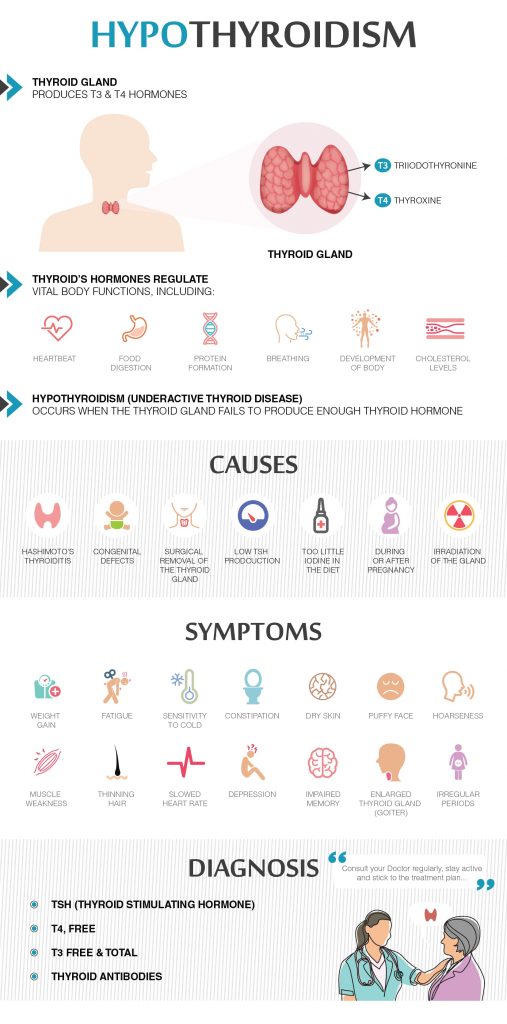Understanding Hypothyroidism
- 18 Dec, 2019
- Written by Team Dr Lal PathLabs
Medically Approved by Dr. Seema
Table of Contents
 Hypothyroidism also called underactive thyroid disease, is a common disorder.
Hypothyroidism also called underactive thyroid disease, is a common disorder.
It occurs when the thyroid gland fails to produce enough thyroid hormone. The condition is more common in women and people over the age of 50.
The thyroid is a small, butterfly-shaped gland at the base of the front of the neck and produces triiodothyronine (T3) and thyroxine (T4) hormones. These hormones affect all aspects of metabolism and also influence the control of vital functions, such as body temperature and heart rate.
The most common cause of hypothyroidism is Hashimoto’s thyroiditis, a disease in which the body’s immune system attacks the thyroid gland.
Other causes include
- Congenital defects
- Surgical removal of the thyroid gland
- Irradiation of the gland
- Failure of the pituitary gland to produce enough thyroid-stimulating hormone (TSH)
- Too little iodine in the diet
- Some women develop hypothyroidism during or after pregnancy
Symptoms
Common symptoms of Hypothyroidism
- Weight gain
- Fatigue
- Increased sensitivity to cold
- Constipation
- Dry skin
- Puffy face
- Hoarseness
- Muscle weakness
- Muscle aches
- Thinning hair
- Slowed heart rate
- Depression
- Impaired memory
- Enlarged thyroid gland (goiter)
- Irregular menstrual periods
Babies with hypothyroidism may have
- Cold hands and feet
- Constipation
- Extreme sleepiness
- Hoarse cry
- Little or no growth
- Low muscle tone
- Persistent jaundice
- Poor feeding habits
- Puffy face
- Stomach bloating
- Swollen tongue
Children and teens have the same signs and symptoms as adults, but they may also experience:
- Poor growth, resulting in short stature
- Delayed development of permanent teeth
- Delayed puberty
- Poor mental development
Complications
Untreated hypothyroidism may result in
- Goiter: An abnormal enlargement of the thyroid gland. A large goiter can make it difficult to swallow or breathe.
- Heart problems: Hypothyroidism may also be associated with an increased risk of heart disease and heart failure.
- Mental health issues: Depression may occur early in hypothyroidism and may become more severe over time. Hypothyroidism can also cause slowed mental functioning.
- Peripheral neuropathy: Long-term uncontrolled hypothyroidism can cause damage to peripheral nerves. Peripheral neuropathy may cause pain, numbness and tingling in the affected areas.
- Infertility: Low levels of thyroid hormone can interfere with ovulation, which impairs fertility.
- Birth defects: Babies born to women with untreated thyroid disease may have a higher risk of birth defects. Infants with untreated hypothyroidism present at birth are at risk of serious problems with both physical and mental development.
Diagnosis
Doctors may order one or more blood tests to check thyroid function. Salient Blood Tests for diagnosing Hypothyroidism are
- TSH (Thyroid Stimulating Hormone)
The most effective and efficient way to diagnose hypothyroidism. TSH level in the blood will be high if you have the disease. - T4, Free
It helps to evaluate thyroid gland function and diagnose thyroid disease. Free T4 is also used to help diagnose congenital hypothyroidism in newborns. Almost all of the T4 found in the blood is bound to protein. The rest is free (unbound) and is the biologically active form of the hormone. This test measures the amount of free T4 in the blood. - T3 Free and Total
It Helps to evaluate thyroid gland function and diagnose thyroid disease. It also helps to monitor the effectiveness of treatment of a thyroid disorder. Almost all of the T3 found in the blood is bound to protein. The rest is free (unbound) and is the biologically active form of the hormone. This test measures the amount of free T3 and total T3 (bound plus unbound) in the blood. - Thyroid Antibodies
To help diagnose and monitor autoimmune thyroid diseases and to distinguish these from other forms of thyroid disease.













